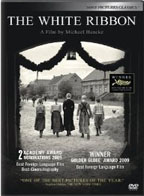
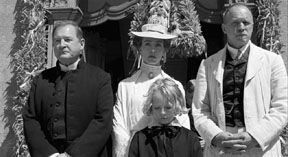 THE WHITE RIBBON
THE WHITE RIBBONAlso Known As
Das Weisse Band
Directed By Michael Haneke
Austria/Germany/2009 – 144 Minutes/Widescreen
DVD Provided by Sony Pictures Classics
Article written by Craig Hamann
For several years before the outbreak of World War I, a series of bizarre events plague a German village. It begins with a horse tripping on a deliberately set wire, which causes the rider, who is also the town doctor, to be seriously injured. The local law investigates, but no one knows who set the wire. Then a woman falls to her death through rotted planks at a work site, which may be the result of negligence by the town baron or perhaps the work of a saboteur. Someone unknown opens a window in an attempt to expose a newborn baby to the icy cold winter weather. A field of cabbages is ripped apart by a scythe, apparently as an act of vengeance against the baron. One of the baron’s sons strangely disappears and is then found with his hands and feet bound, with whip marks across his buttocks. An unknown arsonist sets a local barn ablaze. A farmer commits suicide by hanging himself. A lady’s retarded child goes missing and is discovered bound to a tree, beaten and battered (and possibly blinded), with a terse message calling for divine punishment across his chest. Who is responsible for these dramatic acts against the town? And why would anyone want to commit these deeds?
This is the setting for THE WHITE RIBBON, an outstanding film by writer/director Michael Haneke. Much has been said about this movie being an allegorical microcosm of an evil, even unfeeling, Germany during the period around World War I. I agree in that this is a story about lovelessness and the futility of stagnant dedication, not to mention the absolute failure that infects any society governed by moral Pharisees who are secretly pathetic hypocrites. Here we see the worst kind of abusive rigidity. There is the town Pastor, a tight-lipped authoritarian who spends much of his time mentally and emotionally abusing his children. And that happens when he isn’t beating on both the oldest son and daughter with a cane while the younger siblings stand by and watch. He enjoys humiliating the two oldest children by forcing them to wear white bands, which supposedly symbolizes the “innocence” and “purity” that the children have lost by not behaving properly. The town doctor is also a duplicitous piece of work. This is a man that is supposed to help people and treat them through illness. But apparently it’s fine for the same doctor to have an affair with a mid-wife, who he verbally pummels with insults about how ugly she is, how bad her breath is, and how repulsive she is a person. That’s not to mention that he sexually abuses his 15 year old daughter and feels completely justified in doing so. There is another supposedly morally sound man who punches and kicks his son nearly to death for mistreating the Baron’s spoiled boy. This same man openly flirts and makes sexual suggestions to a 17 year old girl right in front of his wife, who is breast-feeding their baby. It goes on and on. Repressed religious intolerance, blatant disrespect and oppression of women, dark family secrets that involve all kinds of sordid details, the rich prospering off the unappreciated toil of the poor, and a community that is ruled by fear.
This is a film about a sick society and not surprisingly we can even apply some of its message to our own current ills in our country. But make no mistake, filmmaker Haneke does not pound the viewer over his or her head with a symbolically heavy, study your navel, dull soapbox rant. Quite the contrary, that’s what’s so amazing about Haneke’s work. THE WHITE RIBBON is an immensely entertaining, utterly fascinating, multi-textured film that is executed on every level with near perfection. I’m not kidding. It boggles the mind at how good this film is. Haneke’s directorial vision covers the cinematic gamut, being coldly precise yet touching and unflinching but also warmly honest. While Haneke and cinematographer Christian Berger utilize beautifully shot black and white photography, perhaps the director’s greatest feat is his guidance of a cast that never misses a beat anywhere in the movie. Seriously, folks, this might be some of the best acting I have ever witnessed from any ensemble cast, bar none.
But that’s not all. Christoph Kanter’s production design and Anja Müller’s art direction provide stunningly authentic-looking backdrops. Combined with the spot-on set decoration and costume design, the film sometimes feels more like a hard-edged documentary than a creative cinematic undertaking. Haneke’s screenplay is excellent, introducing well-sketched characters and necessary information with barely a hint of expositional dialogue or superfluous digressions. He and editor Monika Willi provide a smooth but not monotonous pace that allows the actors time to develop their roles and the action a chance to build drama and suspense. And yes, there is plenty of suspense. From the first few scenes right through to the offbeat ending, the film unravels the mystery, two-faced deceit, and wretched actions that define the village.
Many thanks to Sony for presenting a DVD that has such a wonderful transfer. The black and white imagery looks great, with obvious respect given to the strong blacks and contrastive style of the film. Equally proficient is the sound work, offering clear dialogue on the track and special attention to the foley accomplishments, which are important in this project regarding both the characters and story. My only complaint about this DVD is that there are no extras, aside from a trailer. If ever a movie cried out for a director’s commentary, this is the one. I’m betting a lot of genre fans, not to mention indie filmmakers, would love nothing better than to walk through this film, scene by scene and moment by moment, with director Haneke. I’m hoping that future releases will have such a commentary and maybe a making-of featurette as well.
Michael Haneke’s THE WHITE RIBBON is a masterpiece of indie filmmaking. It contains a gripping sense of film grammar, highly professional film composition and craftsmanship, and provides a profoundly disturbing but important human story. I highly recommend this film to all genre fans.
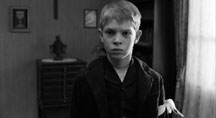 |
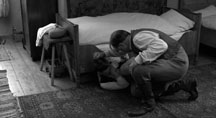 |
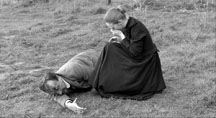 |